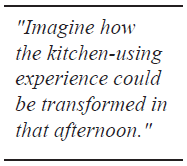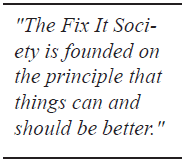One of the things that really sets Olin apart from your average institution is the remarkably strong set of community values that we all enjoy. You can see our honour code in action when we respect one another’s belongings in shared spaces, when we build and share cool projects, or when we cook and share heaps of delicious treats with other students.
But something not-so-nice happens after our good deeds have gone down. All of a sudden, piles of clutter, malfunctioning oscilloscopes, or empty plates become Somebody Else’s Problem (SEP). Think about our kitchens, our stock-rooms, our lounges. Have you ever walked through them and thought to yourself “Yuck, I hope someone cleans this up,” and then carried on with your day? Maybe you accidentally made things a little more cluttered before you left. A dish in the kitchen drying rack. An emptied tray in the stockroom. A stack of semi-useful stuff in the lounges. A drop in the bucket, compared to the mess that’s already there. I know I’ve done it. Let’s be honest: It would be overwhelming to fix that mess myself. I’m busy. I didn’t make it. I’m not responsible. If I worried about every little thing I saw that needed attention, I’d explode!
Q: So then… What’s the problem here?
A: Well, the SEP effect is very common. And it’s a rational way of thinking. I’m not at all saying it’s wrong to feel this way. This article isn’t going to urge you to change your life. Don’t go out right now and fix everything that you once thought of as Somebody Else’s Problem! That’s a superficial ‘solution’ that’s bound to fail, because it doesn’t consider why we do what we do (our motivations) and why we don’t do what we don’t do (our reservations).
The SEP effect leads to a nasty consequence: the Tragedy of the Commons, which occurs when individuals acting rationally engage in behaviour that depletes a shared resource, even though maintaining that resource is in the group’s long-term best interests. It’s a systemic issue, and if we want to improve our quality of life, we need to tackle it with a systemic response.
Q: What do you propose, then?
A: There’s a brand new club called the Fix It Society in which members plan biweekly (fortnightly), well-organized Fixes which are open to the entire student body. In addition to simply cleaning up messes, we’ll try to prevent them from recurring by coming up with and implementing appropriate systems (for organization, amelioration, restoration, etc.). The Group Fixes organized by the Fix It Society will bring together deliberate planning, engaged person-hours, and public knowledge.
Q: What sort of things will you fix?
There are so many options! And just a few constraints: It should be something that benefits many Oliners. It shouldn’t be something we could just work-order. There ought to be space for many people to participate. It shouldn’t require special knowledge or skills. We want to be able to finish it in under two hours, perhaps leaving just a few follow-up tasks for interested parties.
 Imagine what we could achieve with twenty minds and pairs of hands and some club funding, in, for instance, the kitchens. Imagine a team of students cleaned every dish in the blue bins, scrubbing the shelves, counters, and fridge. Imagine they used club funding to wash the hand towels, and buy a label-maker for the cupboards. Imagine they leave the said label-maker there for people to label their food. Imagine they created a sensible check-out system for pots and pans. It might be as simple as writing your name by the door and crossing it out afterwards. Imagine they compiled and laminated a set of basic instructions for future kitchen users to read, and attached it to the door. Imagine how the kitchen-using experience could be transformed in that afternoon.
Imagine what we could achieve with twenty minds and pairs of hands and some club funding, in, for instance, the kitchens. Imagine a team of students cleaned every dish in the blue bins, scrubbing the shelves, counters, and fridge. Imagine they used club funding to wash the hand towels, and buy a label-maker for the cupboards. Imagine they leave the said label-maker there for people to label their food. Imagine they created a sensible check-out system for pots and pans. It might be as simple as writing your name by the door and crossing it out afterwards. Imagine they compiled and laminated a set of basic instructions for future kitchen users to read, and attached it to the door. Imagine how the kitchen-using experience could be transformed in that afternoon.
Obviously, they wouldn’t get everything perfect at once, and things might still slip over time. However, with enough engaged and motivated Fixers helping out, they’d have a good shot a making a difference. And given the number of people involved, I think they’d be perfectly able to maintain the systems they’d set up as well as figure out how to improve on them.
Q: Twenty people! Why would anyone want to participate in these Group Fixes? Right now, people aren’t doing these things. Or they already are doing it, but on their own time.
The Fix It Society is all about helping people be able to choose to Fix things. We want to make Fixing valuable for the Fixers themselves, and our community.
First of all, we want to give Fixers some kudos! The Fix It Society encourages Fixers to indicate when they are actively Fixing by wearing club capes or hard hats. We ask the rest of the student body to encourage the Fixers with high fives, thumbs up, etc.
Next, we want to make people’s achievements public. In-progress and completed Fixes will be proudly displayed in the Campus Center next to Fixers’ names. If you’re not already doing something, we make it easy. Your commitment is structured and the time involved is low. If you’re already doing something, that’s great too! You can have control over Fixes you want to take on outside of Group Fixes, and still gain recognition for your efforts. The bonus of being part of a society is that our efforts are social. You get to work alongside friends and other Oliners, and you’re held accountable to them!
Finally, we know the real way to motivate Oliners to do something: between Group Fixes, participants and Society members gather for food and a discussion of Fixes past and Fixes yet to come.
Q: How on earth are you going to organize all of this?
A: There needs to be a small team of people to take care of all of the logistics of celebrating, rewarding, facilitating, and organizing Group Fixes. If you’re interested in learning more, ask to see our charter.
Q: I wanted to say something else, but we’re too near the end of the article! Also, my questions wouldn’t have been this snarky!
 A: Please forgive me for putting words in your mouth. If you have any further questions, suggestions, or comments, please contact me and I’d be more than happy to address them. (You can find an extended FAQ in the public folder /fixitsociety)
A: Please forgive me for putting words in your mouth. If you have any further questions, suggestions, or comments, please contact me and I’d be more than happy to address them. (You can find an extended FAQ in the public folder /fixitsociety)
The Fix It Society is founded on the principle that things can and should be better. It will be challenging: No one person is at fault for our flaws. Not even all of us together are at fault. Still, when all’s said and done, there is a systematic failure that we need to take care of, and it is all of our duty to help Fix It.